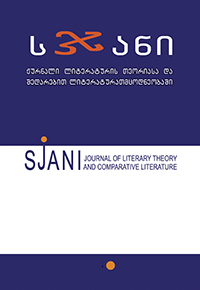Дорога и контакт: Хронотоп дороги в путевых заметках А.С. Пушкина, Гр. Орбелиани, и И. Чавчавадзе
Road and Contact: Chronotope of the Road in A. Pushkin’s, G. Orbeliani’s and I. Chavchavadze’s Travel Accounts
Author(s): Hayate SotomeSubject(s): Language and Literature Studies, Comparative Study of Literature, Russian Literature, Theory of Literature, Georgian literature
Published by: ლიტერატურის ინსტიტუტის გამომცემლობა
Keywords: Chronotope; Road; A. Pushkin; G.Orbeliani; I. Chavchavadze;
Summary/Abstract: In 1829, Alexander Pushkin traveled around the South Caucasus before he wrote “A Journey to Erzurum.” He noted in this text that he had left Erzurum and returned to Russia early because he feared the plague. Two years after Pushkin’s journey, Georgian poet G. Orbeliani detailed his travel to Russia in his own dairy, “My travel from Tbilisi to Peterburg”, describing a Russian “soldier” who was afraid of “plague and cholera,” meeting him with a somewhat discriminatory attitude in Ekaterinograd quarantine. M. Bakhtin wrote in “Forms of Time and of Chronotope in the Novel” that the “road” in the novel represented a contact zone where socially, economically, ethnically, religiously, or generationally divergent people would occasionally meet. It can therefore be asserted that travel writing creates certain (e.g., Orientalist) images of the “other.” Also, the scholor points out the function of road as metaphor of life, which is clearly observed in Orbeliani’s diary that crossing the border from Georgia to Russia means a turning point for his life that he may never get back to his homeland. Bakhtin’s study serves as a reminder of other texts, for instance, Georgian writer I. Ch’avch’avadze’s “The Letters of a Traveler.” “I,” the narrator of this work, is an intellectual educated in Russia who encounters a local Mokhevian named Lelt Ghunia on the road. If contact is a principal cause of infection, Pushkin’s and Orbeliani’s examples elucidate that the road precisely denotes the contact zone in the Georgian literature of the 19th-century and earlier eras. The means of human mobility in modern times are no longer restricted to the road. People can now travel through the air, which has quite rapidly spread the COVID-19 pandemic worldwide. Notably, unlike the European countries, the Russian Empire did not hold overseas colonies; instead, it occupied contiguous lands and then connected the center and peripheries of the Empire with roads. Hence, the road is profoundly and vastly significant to discussions of 19th-century Georgian and other literature(s), especially within the expanses of the Russian Empire, and not only in the context of pandemics.
Journal: სჯანი
- Issue Year: 2022
- Issue No: 23
- Page Range: 212-228
- Page Count: 17
- Language: Russian

